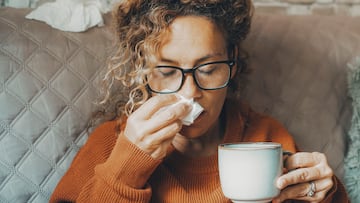What is RSV? Is it the same as Covid?
The Flu, RSV, and covid-19 are all circulating and present with similar symptoms. Who did each of the diseases affect most? How do they all differ?


Flu season is among us, and combined with COVID-19 and RSV, there is much confusion, with many symptoms being shared among the three diseases. With similar symptoms, especially in young children, it can be challenging to determine which virus is making you sick. Cases of all three are up across the country and public health experts are advising that people remain up to date on their vaccines and mask in crowded indoor spaces.
Emergency room visits for flu and COVID are rising, according to the CDC, and RSV infections are still spreading in many states, posing a danger to babies and older Americans.
— CBS Mornings (@CBSMornings) January 3, 2024
Dr. @CelineGounder shares how to protect yourself. https://t.co/bAhsthXPE1 pic.twitter.com/kzJEuQPDlr
If you believe that you or someone in your proximity may have COVID-19 or one of these diseases and are showing symptoms, it is best to contact a healthcare professional for proper testing and diagnosis. At-home tests for COVID are still free in many cities, and four per household can be ordered from the US Department of Health and Human Services.
What is RSV?
RSV, or respiratory syncytial virus, is similar to the common cold and can infect children and adults. The highlighted contagious virus can appear more severe in infants and elderly people. Those with RSV tend to be sick for one to two weeks. The disease should be taken seriously as it can lead to more dangerous illnesses in adults and children, such as bronchiolitis.
According to Lab Corp, some of the symptoms include:
What are the symptoms of RSV?
- Fevers
- Chills
- Headaches
- Cough
- Muscle soreness
- Fatigue
- Vomiting
- Diarrhea
- Shortness of breath
- Runny nose
- Sore throat
Most people who become ill with RSV do not experience a severe case, but some people, “especially older adults and infants younger than six months of age, may need to be hospitalized if they are having trouble breathing or are dehydrated.”
How does RSV differ from covid-19?
RSV is more commonly found in infants and children. The elderly and young children are more susceptible to RSV. However, with COVID-19, the elderly are at a higher risk compared to children, who tend to recover quickly from the virus even if they experience any symptoms.
In terms of symptoms, one of the primary differences between the two diseases is that individuals with COVID-19 may experience a loss of sense of taste or smell.
What can you do to treat RSV?
Related stories
To manage symptoms associated with the virus, the CDC recommends first talking with a “healthcare provider before giving your child nonprescription cold medicines. Some medicines contain ingredients that are not good for children.” Some options also can include taking “over-the-counter fever reducers and pain relievers, such as acetaminophen or ibuprofen” and keeping hydrated.
How do you test for each of the viruses?
Some doctors will offer you a three-in-one test for COVID-19, the Flu, and RSV. This is the easiest way to find out which you may have.

